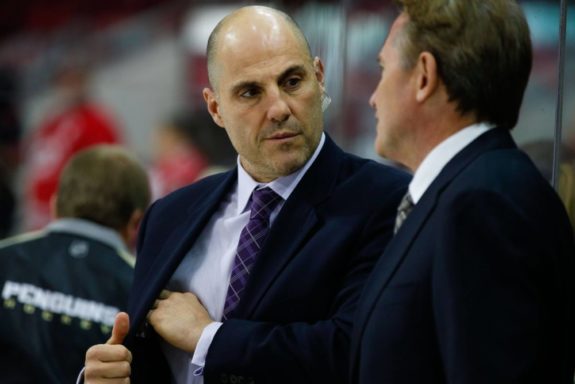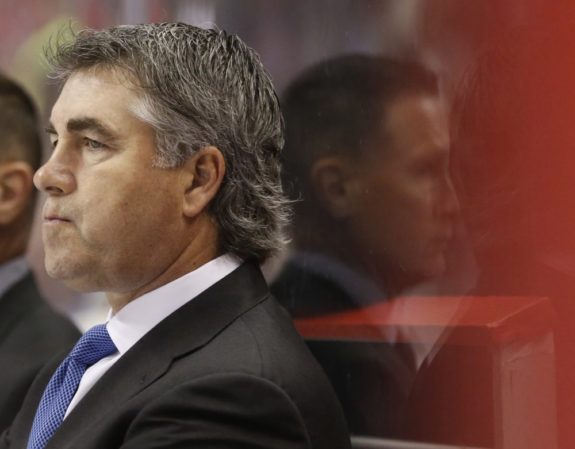It’s been two weeks since the Arizona Coyotes introduced Rick Tocchet as their new head coach on July 11, and it’s clear that he’s already hard at work with his preparations for the 2017-18 NHL campaign, as it was announced Wednesday that he had selected John MacLean and Scott Allen to be his assistants behind Arizona’s bench for the upcoming season.

While hiring two experienced assistant coaches is a good first step for Tocchet, there’s a lot more work to be done in Arizona after five consecutive seasons of disappointment under Dave Tippett. Let’s take a look at a few of the areas that Tocchet will have to improve upon over his predecessor in order for his Coyotes to have success in Year One.
Road Woes
The facet of the game which has arguably plagued the Coyotes the most over the past five seasons is their inability to play well away from Gila River Arena. Since the start of the 2012-13 season, the Coyotes have accrued a road record of 60-99-29, which amounts to an absolutely dreadful total of 149 points in 188 road games. Only the Buffalo Sabres, with a road record of 59-109-20, have been worse over that span.
Although the Coyotes have missed the playoffs in five consecutive seasons, they were competitive during three of those campaigns and likely would have made postseason appearances if they were able to win on the road with any degree of consistency.
During the lockout-shortened 2012-13 campaign, the Coyotes finished four points behind the Minnesota Wild for the final playoff spot in the Western Conference. Although their 14-8-2 record on home ice was comparable to other playoff teams in the league, their abysmal 7-10-7 road record ultimately cost them a chance to make a fourth consecutive playoff appearance.
The story was the same during the 2013-14 season – despite again finishing with a solid home record of 22-14-5, the Coyotes missed the playoffs by just two points, owing, in large part, to their dismal 15-16-10 road record. After a miserable 2014-15 season, the Coyotes rebounded and won 22 home games during the 2015-16 campaign. However, an awful 13-24-4 road record effectively put to bed any real hopes of earning a potential playoff berth.

Although things have been rough lately, the Coyotes weren’t always a bad road team under Tippett – during his first three seasons on the job (from 2009-10 to 2011-12), the team posted a 63-42-18 road record in 123 regular season games, which was good enough for seventh in the league over that span. However, the Coyotes were unable to sustain that level of success for long, and Tippett is out of a job as a result.
Despite their failures on the road under Tippett during the last half-decade, the Coyotes actually have been a decent home team – minus the dreadful 2o14-15 “Tank for McDavid” season, they’ve accrued a 76-55-16 record at Gila River Arena since the start of the 2012-13 season. That equates to a 57.1% points percentage, which amounts to a 93-point-pace when calculated over the course of an 82-game season.
It’s clear that Tocchet has his work cut out for him in the desert, but if he’s able to get the Coyotes to perform as well on the road as they do at home, it’ll make his job a lot easier.
Problematic Penalty Kill
Another area which also has plagued the Coyotes in recent years is the penalty kill. Like Arizona’s play away from home, their penalty kill was once considered a team strength – the Coyotes killed penalties at a rate of 82.7% from 2009-10 thru 2011-12 and earned three consecutive playoff berths due, in part, to their solid play while shorthanded.

However, since their run to the 2012 Western Conference Final, Arizona’s penalty kill has been dreadful – the team has killed penalties at a rate of just 77.9% over the last five seasons, which puts them dead last in the league in that category and more than a full percentage point behind the 29th-place Buffalo Sabres.
The Coyotes have taken steps to address this problem over the offseason, as they acquired three-time Stanley Cup champion defenseman Niklas Hjalmarsson from the Chicago Blackhawks in an effort to shore up what has been a porous blue line. However, it’ll ultimately be up to Tocchet to implement the necessary changes in Arizona’s penalty killing strategy in order for the team to improve upon their lackluster play while shorthanded.
Power Play Issues
Additionally, Arizona’s power play has also struggled in recent seasons. In general, the Coyotes have never been known for the lethality of their power play unit, but they did have a short run of success under assistant coach Newell Brown during the 2013-14 and 2014-15 campaigns. From the start of the 2013-14 season through Feb. 28, 2015, the Coyotes converted upon 20.5% of their power play chances, which put them at sixth in the league over that span.
However, everything changed when Keith Yandle was dealt to the New York Rangers at the trade deadline in 2015 – since Mar. 1 of that year, the Coyotes have converted on just 16.7% of their power play opportunities, putting them squarely in the bottom five of the league in power play percentage over that span.

Although he was often criticized for his play in his own zone during his time in the desert, it’s clear that Yandle had a huge hand in Arizona’s run of success with the man advantage, and it’s clear that they’ve yet to make up for his absence on the offensive end of the ice. Now, two years after the trade, Brown is out of a job, and the task of fixing Arizona’s struggling power play will fall to Tocchet and his staff.
Tocchet’s Test
Overall, Tocchet will have his work cut out for him in the desert this season. He’ll need to fix Arizona’s woeful special teams play and will need to get his group to perform significantly better when playing away from home in order for the Coyotes to avoid missing the playoffs for the sixth consecutive season. Can it be done in Year One? No one knows for sure at this point, but one thing that’s known for certain is that these won’t be the “same old Coyotes” of years past.